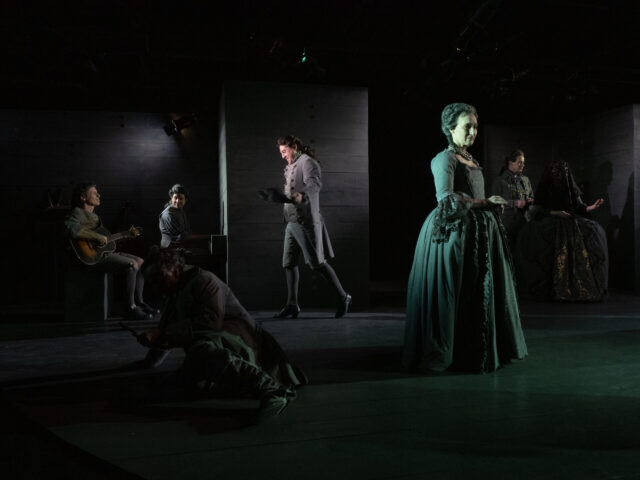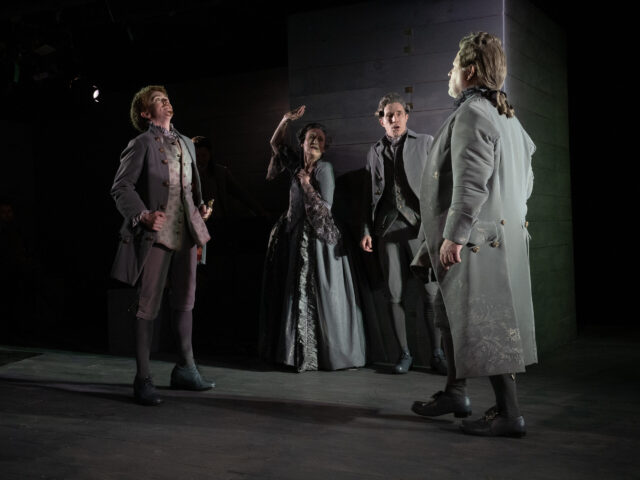
Axis puts a dark spin on Shakespeare’s Twelfth Night (photo by Pavel Antonov)
TWELFTH NIGHT
Axis Theatre Company
One Sheridan Sq. between West Fourth & Washington Sts.
Wednesday – Saturday through May 25, $11-$44, 8:00
866-811-4111
www.axiscompany.org
I described the last two productions I saw of William Shakespeare’s 1601–02 Twelfth Night as “light and lively,” “ecstatic,” “a joy to behold,” and “a pure delight.” I would not use any of those words to describe Axis Theatre Company’s streamlined new production, but that won’t stop me from heartily recommending it.
Shakespeare professor Marc Palmieri’s adaptation focuses on the darker side of this mistaken-identity romantic comedy about unrequited love, which has been trimmed to a fast-paced ninety minutes. David Zeffren’s lighting remains dim throughout on director Randall Sharp’s haunting stage, where actors are surrounded by large rectangular blocks and shadowy entrances; in one corner, guitarist and sound designer Paul Carbonara and pianist Yonatan Gutfeld (the keyboards are embedded in one of the blocks) perform Carbonara’s subtle Baroque-like score. Karl Ruckdeschel’s costumes — men’s suits and long coats, women’s gowns — are muted grays, lavenders, and earth tones; even Malvolio’s socks are a subdued yellow, not as garishly ridiculous as usual.
“If music be the food of love, play on / Give me excess of it,” Duke Orsino (Jon McCormick) declares as the show begins. The story is familiar to Shakespeare aficionados: In faraway Illyria, the wealthy countess Olivia (Katy Frame) rejects all suitors, including Orsino, who is in love with her. Her loyal steward, Malvolio (Axis producing director Brian Barnhart), also harbors a secret passion for the noblewoman. Twins Viola (Britt Genelin) and Sebastian (Eli Bridges) survive a shipwreck and wash up onshore, each ignorant that the other is still alive. One of the duke’s gentlemen, Curio (Robert Ierardi), explains to Viola, who has now disguised herself as a man named Cesario, that Olivia keeps repulsing Orsino’s advances. Viola quickly decides that she will convince Olivia to see Orsino in order to secure a place for herself in the duke’s employ.
Sebastian was rescued by Antonio (Jim Sterling), a sea captain who requests to be his servant. Believing his sister to be dead, Sebastian disguises himself as Roderigo and heads to the court of Orsino, where Antonio is not welcome.
Meanwhile, a group of conniving drunks hover around Olivia: her uncle, the raunchy Sir Toby Belch (George Demas); Sir Toby’s friend, the faux-elegant squire Sir Andrew Aguecheek (Andrew Dawson), who Sir Toby presents to Olivia as a potential suitor; Olivia’s chambermaid, Maria (Dee Pelletier); Olivia’s fool, Feste (Spencer Aste); and her servant Fabian (Brian Parks). “You must confine yourself within the modest limits of order,” Maria warns Sir Toby, who replies, “Confine! I’ll confine myself no finer than I am: these clothes are good enough to drink in; and so be these boots too.”

Axis Theatre Company’s Bard adaptation continues through May 25 (photo by Pavel Antonov)
After Malvolio chastises them for their ill behavior, Sir Toby, Sir Andrew, Feste, and Fabian, under Maria’s lead, concoct a plan to embarrass Malvolio in front of everyone. Maria explains, “Marry, sir, sometimes he is a kind and affectioned ass / the best persuaded of himself, so crammed, as he thinks / with excellencies, that it is his grounds of faith / that all that look on him love him / and on that vice in him will my revenge find / notable cause to work.”
It all comes to a head in a grand finale that, while not as boisterous as in other iterations, is as satisfying in its exactitude.
Axis refers to Twelfth Night as “Shakespeare’s most painful comedy,” and that’s just what Sharp, Palmieri, and the superb cast deliver. The company’s dungeonlike space on Sheridan Square is tailor-made for eerie, chimeric stories bathed in gloom, doom, and gothic and apocalyptic humor. In such previous works as High Noon, Dead End, Last Man Club, and Worlds Fair Inn, Axis founding artistic director Sharp has presented stark, compelling productions heavy in dark atmosphere but not without comic moments.
In this Twelfth Night, Olivia is fretful, often edgy with anxiety. She has no friends, only those who want her wealth or favor. Many of the characters, from Malvolio and Olivia to Feste and Sir Toby Belch, have a slightly pathetic bent to them. When Sir Andrew proclaims, “Shall we set about some revels?” and Sir Toby replies, “What shall we do else?,” the revelries that follow are not exactly a fanciful, fun frolic. Feste sings “O Mistress mine where are you roaming?” and “When that I was and a little tiny boy (With hey, ho, the wind and the rain)” and Carbonara and Yonatan Gutfeld’s music ramps up, accompanied by Lynn Mancinelli’s period choreography, but it’s not quite a royal ball. A subtle cloud of desperation hangs over the festivities. In fact, sometimes it feels like a night on the Bowery. Even the revelation scenes are kept relatively low key.
Twelfth Night demonstrates precisely what Sharp and Axis do best, whether offering an original play or a fresh take on an old chestnut. As always, they also include a related window display at the bottom of the theater entry stairs, this time providing added ambience and some shipwreck Easter eggs but no cakes and ale.
[Mark Rifkin is a Brooklyn-born, Manhattan-based writer and editor; you can follow him on Substack here.]